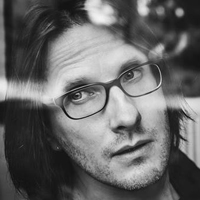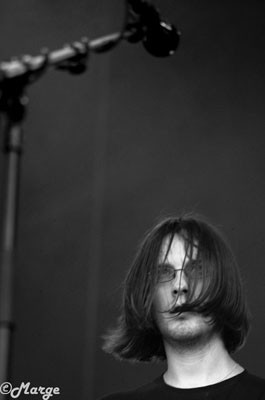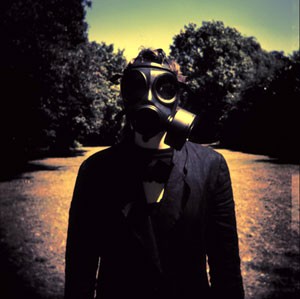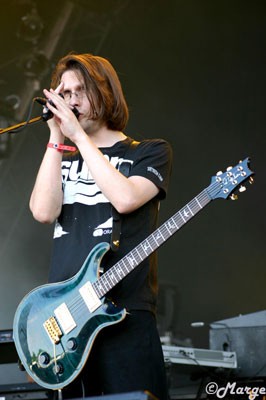Steven Wilson interview (04/2009)

| With: | Steven Wilson |
| Conducted by: | Jeff (phone) |
| Published: | 10.04.2009 |
|
Band profile: |
Steven Wilson |

Jeff : I met you in Toulouse and we did an interview and you told me that you maybe wanted to have a little break but you're already back, you're always working (laughs).
Steven: Well, in a way it was a break from being on the road because Fear of a Blank Planet tour was very long? in 2007 I was on the road the all time. The 2008 was an opportunity to stay home and to work on something different. The choice I made was to work on a solo record, and actually, in the event, the solo album became quite an international project so I did travel quite a lot around the world to do that, but you know it was fun, it's not like being on the road, which is quite hard work and quite stressful and quite tiring. I could describe the process of making the album as almost like a kind of vacation, in a way. It wasn't just working, it was also meeting people, hanging out, experiencing some cities that I hadn't really spent much time in until then? and along the way also making this solo record and a film, a documentary, as well.
- A lot of things! About the new album, how do you pronounce its name? Is it some kind of Spanish word?
Most people pronounce "Insurjentes" in an English way, but the Spanish way is different (Steven pronounces it in Spanish).
- So what's the meaning of this word?
Literally it means insurgence rebels. It's actually the name of the biggest street in the world which runs through Mexico City, where I did quite a lot of the writing and the work on the record, so I got a lot of inspiration for the record. So this street is such a kind of landmark that anyway you are in the city you would see this word. And I like the idea of the title of the album being "Insurgentes", because although I'm not kind of rebel in the traditional way that we think of, rock 'n roll?
The way I have chosen to conduct my career as a musician, the way I've chosen to position myself in the music industry and the way I've chosen to make music is what you might call quite unconventional or unusual - it's certainly not the way that you supposed to conduct your career as a musician if you want to be successful. So, in that respect, I have been quite rebellious in my own natural way - even the fact of moving from style to style, from gender to gender you know, it's quite unusual for musicians to do. It's not something that people understand very easily - that one many it wants to do a death metal album and the next many it want to do a pop album or the next many he wants to do an R 'n' B record. And that's quite rebellious and quite unusual in the music industry today. So, I like the idea of my first solo album being called "Insurgentes" - literally, "rebels".
- So I understand now. So, this is only your first solo album, why did it come so late, why didn't you make it before?
Oh, in a way I did, because the early PT albums were solo records and I had solo projects like Bass Communion, but I think the difference now? it's that with twenty years of kind of experience behind me, and almost thirty years now of listening to music and being inspired and influenced by music, and also cinema, literature and the experiences that I had in my lifetime so far. And I think I broad so much interest in different music styles and I believe that this is the first time really that I can honestly say that this single record represents all of the different aspects of my musical personality. Even with a project like Porcupine Tree? well I think that a lot of people believe that PT is somehow my project. In a way it is, because I write the majority of the materials and I suppose I have creative control. But still there are other people in that band and I wouldn't ask them to play music if I did not think that they would enjoy or understand. So there were still some aspects of my musical personality that I don't think I had really expressed before this solo record. So the reason this is the first time that I can really say this is an album by Steven Wilson is because the first time I can honestly say, everything of my musical personality is represented in this record. From the rock, to the grunge, the pop to the progressive, the psychedelic? it's all in this one record.
- I read on your biography that you said you realized that those songs would fit perfectly under your name. What are the differences between Steven Wilson alone and Steven Wilson with Porcupine Tree, Blackfield or your other projects?
Well of course you would hear those things in this record, I "come this guys" the fact that you would hear elements of things that you probably recognize from PT, BF and no-man, they are part of my musical personality. But you'd also hear some things that are quite new for me, for example the use of quite extreme noise on some of the tracks. I don't mean metal noise, I mean pure noise, extreme, like almost industrial noise. For example in a track like "Get what you deserve" which starts with the very simple piano and voice ballad, which by the way is also something that you wouldn't really hear on my previous records, something so simple as just a piano and a voice? So, it starts with this very simple piano and voice ballad and gradually, after the sixth or seventh minute, the track runs, the ballad is obliterated by a world of complete noise. And that idea is kind of a very cinematic idea. It's the sort of thing that you might get from movies rather than music, this idea that one moment you have this scene, very happy and very calm, happening and in the next scene you have something quite violent which destroys the mood that you had from the previous scene. It's not something you get so much in music. Most songs or pieces of music tend to be in one mood whether it's melancholic, whether it's angry, whether it's happy, sad, whatever. So the idea of taking a piece of music and having that kind of shift of atmosphere and mood in such an extreme way, we're talking about going from something very beautiful to something very brutal. And I think this is quite new for me. I kind of experiment this kind of idea and that mood shift in PT but not really to this level. So that's one thing. Another thing is almost complete lack of keyboards on this record. Almost all of the sounds that I think people think are keyboards are actually guitars? so starting to use the guitar in a more experiment way that sometimes sounds like something completely abstractive from guitar. So again, that's something that I probably wouldn't do so much in PT because of course PT have a keyboards player, and a very good one. So there's not so much need for a guitar to be used in such a kind of atmospheric or textural way. So again that's something quite new for me on this record. They are just a couple of examples of things I think are different.

- I suppose that a lot of people talk about it, but what is the symbolism about the picture with you and the mask?
It's not trying to make any serious? it's funny because a lot of people do political comment about it: German wars or the conflict going on in the middle east or something like that but actually, that's nothing like that. What I did with the solo album was travel around with my friend and film maker Lasse... Well we're huge fans of surrealism and European cinema and we love the idea of playing with images and surrealism. We're also big fans of this idea that you have? in fact if you look at the last few PT albums, there is a pattern, there is a person or a human presence on the cover of each of these albums. But somehow the face is not revealed, or the face is distorted or covered. So if you think at the "Fear of a Blank Planet" cover you have the face of the child, on "In Absentia" you have a distorted face and so on... I think that we both like the idea of the human personality somehow interrupted, or distorted, or obscured and I think that tried to continue with this record. Here you have me on the album and that's normal because after all, that's my solo album, but it was just good to have this gas-mask because, again, you can't actually see the face. It's a good way to do a rebellion against the normal way to present your solo album. At least we don't have some studio shot and glamorous shots of the artist... What we have here is a picture of me with the gas-mask (laughs).
- But it's cool! (laughs)
It's cool, and it's really perverse and surrealistic! That's me and that's what I'm a fan of, I guess...
- You told me that you have recorded this album all around the world - Japan, Mexico, Israel... Well, first can you tell me why you did that and secondly, what are the good and bad points to record an album that way?
Well it was quite an expensive record to make. I suppose that it's the bad point, cause I was travelling a lot staying in hotels and stuff. I spent a lot of my money on this record. But the reason to do that was firstly to have fun. I think it's important that you have to have fun when you record and play music. I've never quite understood why the process of creation becomes some kind of torture for some artists. I want to have fun making my records, it can be surprising when people listen to them because it's quite dark and tortured - but I had great fun making them. When I was making my solo record I was free really to make this album in any way that I chose. And I thought that it could be fun to make it on a road trip and meet some people and find some inspiration and have some fun, partying all around the world. Also Lasse was filming, so I had in my mind that it could important for the film. It would be much more interesting to film a trip all around the world than simply me in my studios. Has it affected a lot the album? I'm not? well, I think that you have some things like the title of the album which came from this street in Mexico, well some instruments are Japanese, that's something that would probably never have happened if I was not travelling... Some things definitely came from that travelling experience.
- I understand now. And about the movie, will you release a DVD or some kind of documentary? What will it be?
Yes! Well you can divide it in three basic elements. The first one is a film about me making a record, that's the main thing. But I thought that it was maybe boring to only do that, so we add other elements. So we decided that we could speak to other musicians, producers and engineering when we were travelling. It was a way to show feeling of musicians from all around the world, now that we're living this numeric era with Mp3, downloads and everything... How they make music, how they manage to survive and so on... A lot of people listen to music now in a really poor quality, and of course Mp3 is a fairly poor quality system... So we spoke with a lot of people about it and we tried to get some ideas about that. In this documentary you'll see why and how the music industry has changed in the last five years, it's enormous - it has a massive impact for the musicians. That was another thing that we wanted to show. The last point was to show a surreal aspect to our tastes. We love European cinema and we tried to film everything bizarre and strange. So in the movie sometime you'll hear the music like a sound track with surreal but beautiful images from some of the countries that we have visited. The best way to sum up everything is to talk about a real surreal road movie. I think that we will try to introduce this movie in some festival this summer and eventually to release it as a DVD in September.

- Now I will talk about you as a producer. One more time you're the producer of you own album - "Fear of a Blank Planet" was acclaimed by the reviews and critics to be one of the best production ever done for an album and you even got an award right?
Yeah, we had a Grammy nomination for the album.
- Yeah what does it represent to you to win an award for your work as a producer?
Well obviously it's very flattering. The whole thing about awards in a way... well you have to remember that it's just a few people opinion. For many years now I always tried to do good sound for my records as much as I possibly can, that's important to me. And I think that the fans are really grateful, they like the quality of the music. It was nice that finally some of the mainstream finally realized that it was this guy and this band which was making high quality record. When you have something like other people in the mainstream notice it and start to take you a lot more seriously. So once we had the Grammy nomination, certainly a lot of people, journalists, TV who probably never heard of Porcupine Tree started to notice, simply because of this Grammy nomination. It's the same with Charts lists you know. It's a way to get more exposure. I gave my award to my mum, she was happier than me to have it (laughs). It's not so important for me personally but it's certainly important for our career.
- It's a good promotion... And about "Insurgentes", did you try some kind of new recording methods or did you just follow the way of recording of "Fear of a Blank Planet". Are you someone who is always trying to find some kind of new machines, computers to have a better sound each time?
I wouldn't say that I'm looking for better means to have a better sound but I'm certainly looking for new ways to inspire the music and keep things fresh. I'm not really interested in repeating myself. The way that I recorded this album was totally new for me. In general, with Blackfield and Porcupine Tree I spend a lot of time on the lyrics to have deep meanings and very strong senses, but I did something very different with this album because I improvised almost all the lyrics. So I stood up the microphone and I simply improvised the lyrics as an experiment to see what would happen. Some were rubbish (laughs), some other were interesting. This time I like the fact that the lyrics are more a part of the music and that they wouldn't be so important. That's a new approach for me. It can be scary sometimes to try new things and do some adventuring. But I did something special with vocals on this album and somehow they're more natural and maybe have more emotion and feeling, because I was not singing words from a page but directly words from my own. Maybe that some logical sides of the lyrics are missing but it was an intense new experience to do.

- I understand. And about your other projects as a producer? Any news from Orphaned Land and Anathema side?
Ho god, I'm waiting for all those guys to finish their bloody records! (laughs). Orphaned Land asked me to produce their album in 2005!
A guy is talking to Steven...
Ho, unfortunately Jeff we have to finish the interview... I'm sorry!
- Ho damn, not a good way to finish an interview, a lot of questions are missing! (laughs).
I know, I'm sorry, but we will talk about it other time, don't worry!
- So thank you Steven, have fun tonight with Aviv and see you soon!
Thanks Jeff, it was nice to talk to you, see you later!
Thanks to Steven Wilson and Florian Sliwa for this interview. Thx to Destroyah and Marge for their help.
Comments
Comments: 8
Visited by: 193 users
| dancingdecember |
| BloodTears ANA-thema Elite |
| Daniel |
| MetalManic |
| Corwin |
| Daggon Underpaid M.D. |
| Dislocated Soul |
| Death_95 |
Hits total: 16872 | This month: 12







